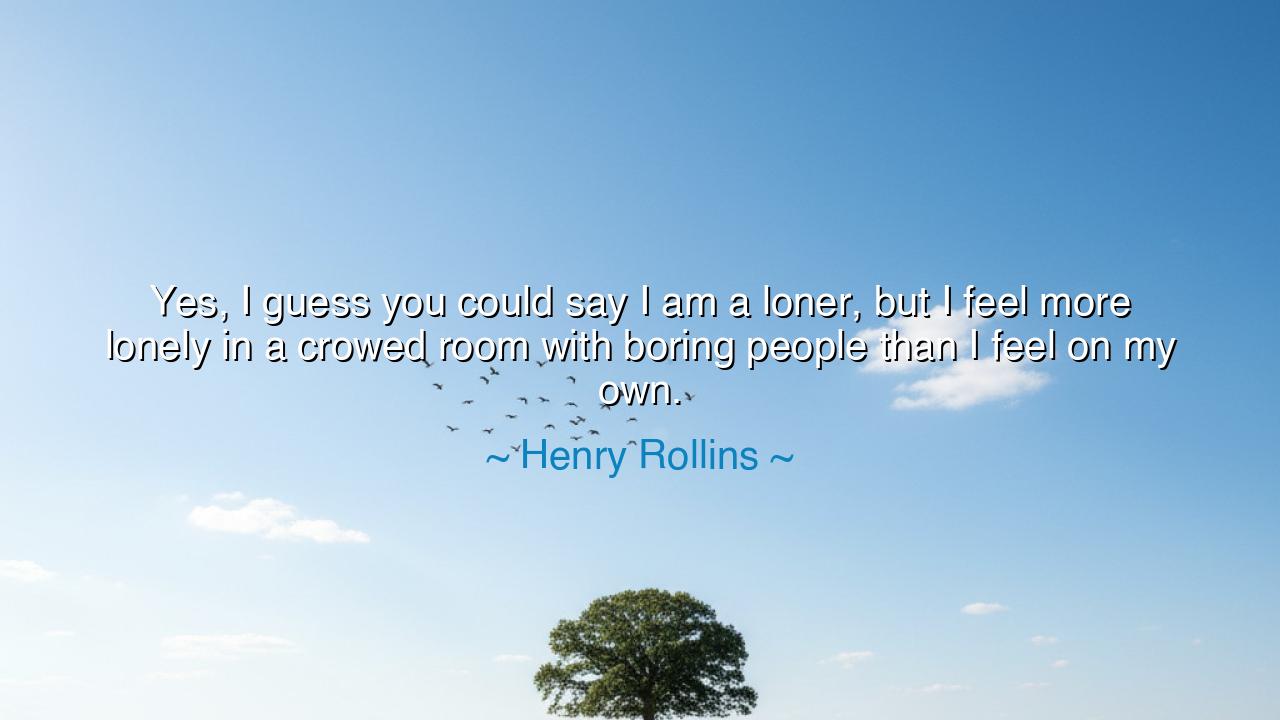
Yes, I guess you could say I am a loner, but I feel more lonely
Yes, I guess you could say I am a loner, but I feel more lonely in a crowed room with boring people than I feel on my own.






“Yes, I guess you could say I am a loner, but I feel more lonely in a crowded room with boring people than I feel on my own.”
Thus spoke Henry Rollins, the poet-warrior of modern solitude — a man forged in the noise of punk stages and the silence of reflection. In this confession lies a truth as ancient as the soul itself: that loneliness does not come from being alone, but from being surrounded by those with whom one cannot connect. Rollins speaks for all who have felt the hollow clamor of empty company, for all who have discovered that the most desolate place is not an empty room, but a crowded one where no heart speaks to yours.
To be called a loner is, in the language of the world, to be pitied — yet Rollins wears the name as a crown. For solitude, when chosen, is not a wound but a weapon. He tells us that being alone among truth is far better than being together in pretense. The crowded room he speaks of is not merely a physical space, but the vast emptiness of shallow connection — a gathering of voices without meaning, laughter without soul. Such company drains the spirit, while solitude renews it. Thus, the true loneliness is not of isolation, but of inauthenticity.
The ancients too understood this paradox. The philosopher Diogenes lived in a barrel in the streets of Athens, scorning the false brilliance of society’s gatherings. When asked why he preferred solitude, he replied that he found more wisdom in his own thoughts than in the foolish chatter of the marketplace. Likewise, the Roman emperor Marcus Aurelius, surrounded by power and counsel, wrote his Meditations alone beneath the stars. He too felt the ache of being lonely in the crowd, and sought truth not in the noise of others but in the silence of the self. Rollins’s words are but a modern echo of this ancient solitude — fierce, clear, and uncompromising.
Consider the story of Vincent van Gogh, who wandered the fields of France painting light that no one else could see. Surrounded by people who did not understand his vision, he lived a life of apparent isolation. Yet, in his solitude, he found communion with color, with nature, with eternity. His letters reveal a man who suffered not because he was alone, but because he longed for depth in a world of surfaces. Like Rollins, van Gogh preferred the solitude of his art to the emptiness of shallow company. In his loneliness, he found something greater than conversation — he found meaning.
Rollins’s words also remind us that solitude is not rejection, but self-respect. To walk away from dullness and falsehood is not arrogance; it is fidelity to the soul’s hunger for truth. The spirit that thrives in solitude is not bitter, but discerning. It knows that genuine connection cannot be forced, and that the company of one’s own thoughts, though demanding, is far more honest than the company of many who pretend to feel. For in solitude, one faces the self as it is — raw, unvarnished, real — and that encounter, though difficult, is sacred.
Yet there is also wisdom in Rollins’s implicit warning: one must not mistake solitude for superiority. The loner’s path is not the path of disdain, but of authenticity. The goal is not to flee humanity, but to find the kindred souls who speak in the same rhythm as your heart. It may take years, or even a lifetime, to find them — but when you do, the silence of your solitude will make their presence all the more profound. Thus, solitude is the forge in which true friendship is tempered; without it, connection is shallow, and company becomes noise.
The lesson of Rollins’s words is both fierce and freeing: learn to be alone without fear, and you will never again be lonely. Choose authenticity over approval, depth over popularity, silence over empty conversation. When you walk into a crowded room, let your spirit remain your own. If the company you find there deadens your heart, walk away without regret — for solitude that nourishes is better than company that starves. Seek not the crowd, but the kindred flame; seek not attention, but understanding.
So remember, my child of the future: loneliness among the shallow is worse than solitude among the wise. Be brave enough to be your own companion. Walk through the noise of the world with the strength of silence in your heart. For the one who can be at peace alone has already mastered the art of belonging — not to the crowd, but to themselves. And that, as Rollins teaches, is the beginning of freedom.






AAdministratorAdministrator
Welcome, honored guests. Please leave a comment, we will respond soon